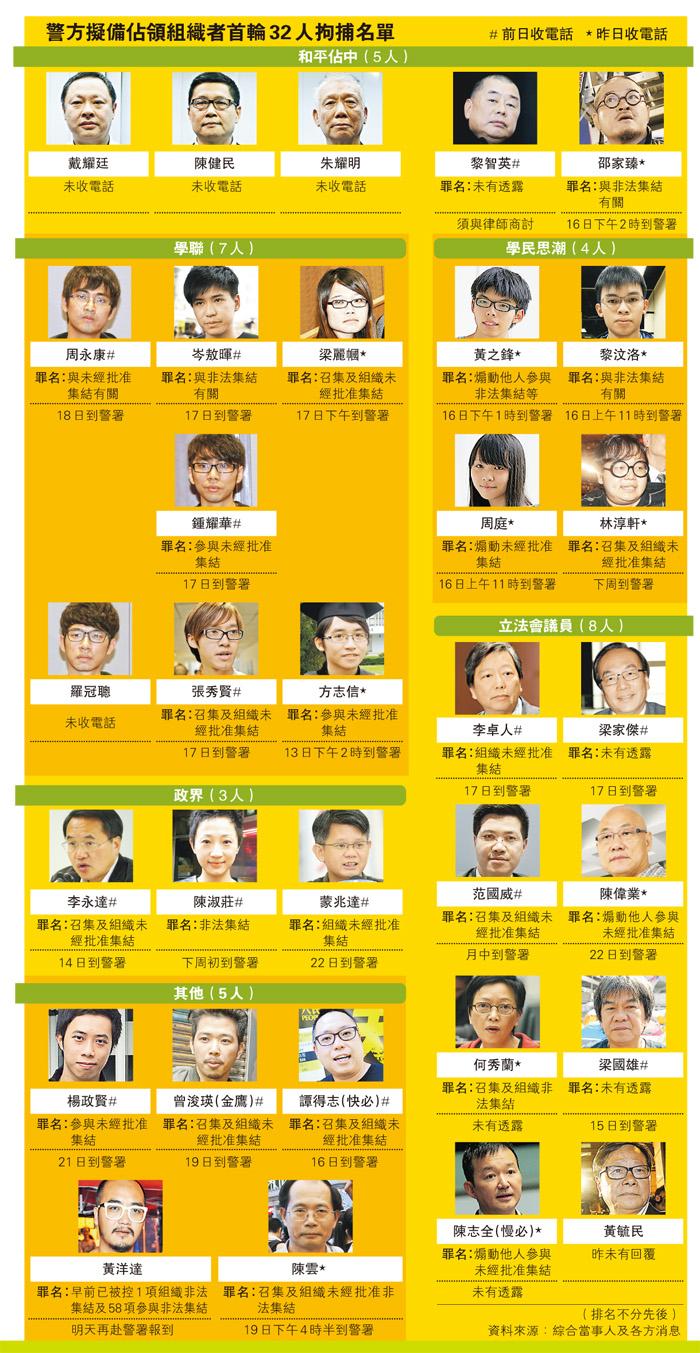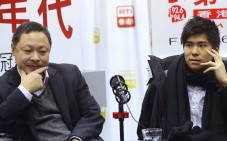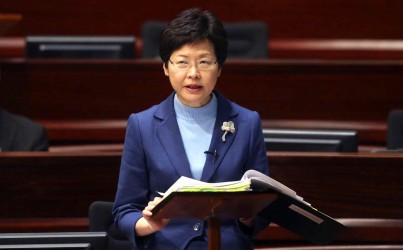
Occupy Central
Occupy Central is a civil disobedience movement which began in Hong Kong on September 28, 2014. It calls on thousands of protesters to block roads and paralyse Hong Kong's financial district if the Beijing and Hong Kong governments do not agree to implement universal suffrage for the chief executive election in 2017 and the Legislative Council elections in 2020 according to "international standards." The movement was initiated by Benny Tai Yiu-ting (戴耀廷), an associate professor of law at the University of Hong Kong, in January 2013.

Umbrella Movement
The Umbrella Movement (Chinese: 雨傘運動; pinyin: yǔsǎn yùndòng) is a loose political movement that was created spontaneously during the Hong Kong protests of 2014. Its name derives from the recognition of the umbrella as a symbol of defiance and resistance against the Hong Kong government, and the united grass-roots objection to the decision of the Standing Committee of the National People's Congress (NPCSC) of 31 August.
The movement consists of individuals numbering in the tens of thousands who participated in the protests that began on 28 September 2014, although Scholarism, the Hong Kong Federation of Students, Occupy Central with Love and Peace, groups are principally driving the demands for the rescission of the NPCSC decision.
The movement consists of individuals numbering in the tens of thousands who participated in the protests that began on 28 September 2014, although Scholarism, the Hong Kong Federation of Students, Occupy Central with Love and Peace, groups are principally driving the demands for the rescission of the NPCSC decision.
POST OCCUPY CENTRAL - DAY 23:
Full coverage of the day’s events

Occupy leaders predict fresh protests over new government political reform consultation
Occupy Central leaders anticipate another round of mass pro-democracy protests to be triggered when Chief Secretary Carrie Lam Cheng Yuet-ngor launches the latest consultation on political reform.
Hong Kong begins second consultation on electoral reform
Chen Zuoer says he is open to discussion on the idea of allowing residents to veto all candidates in the 2017 chief executive poll, amid concerns that the field would be favourable to Beijing.

2017: Seize the Opportunity - Carrie Lam

By Carrie Lam, Chief Secretary for Administration
Over the past year, all eyes in the city have been on events surrounding political reform.
Step One of the "Five-step Process" of constitutional development started when the Chief Executive (CE) submitted a report to the Standing Committee of the National People¡¦s Congress (NPCSC) in July last year, following the completion of the first round of public consultation on constitutional development in May last year.
After considering the report of the Hong Kong Special Administrative Region (HKSAR) Government and views from different sectors of the Hong Kong community, the NPCSC adopted the 'Decision of the Standing Committee of the National People¡¦s Congress on Issues Relating to the Selection of the Chief Executive of the Hong Kong Special Administrative Region by Universal Suffrage and on the Method for Forming the Legislative Council of the Hong Kong Special Administrative Region in the Year 2016' (the Decision) on 31 August 2014.
The Decision stated that universal suffrage for the CE election can be implemented from 2017. This Decision concluded Step Two of the "Five-step Process".
Then, we had 79 days of illegal occupation in Hong Kong. Social order and the daily lives and works of the public generally resumed normal in mid-December last year. Now, in the blink of an eye, 2015 has arrived.
I just made a statement at yesterday's Legislative Council (LegCo) meeting, launching the second round consultation on constitutional development. Members of the public are invited to express views on the method of universal suffrage to be adopted for the CE election. This is part of the preparation for Step Three of the "Five-step Process", which requires the Government to propose a reform package to LegCo.
Following the Decision made by the NPCSC, 23 pan-democratic legislators from the "Lunch-box Meeting Group" have vowed to boycott the second round consultation on constitutional development and vote against any proposal to be drawn up by the government. Apart from them, four other pan-democrats hold an even more radical stance. On the face of it, there is a slim chance our reform proposal will get passed. As such, some might ask: "What's the point of the second round consultation if it is doomed to go nowhere?"
The answer to that question is that it is our solemn duty to do so, and we will never give up our efforts to rally public and LegCo support despite the gloomy prospect. The odds may be against us, but this is not a mission impossible. And that is because we have a firm conviction that implementing universal suffrage for the 2017 CE election in accordance with the law is definitely beneficial to Hong Kong and is an opportunity that must not be cast aside.
First, selecting the CE by universal suffrage is the common aspiration of the Central Authorities, the HKSAR Government as well as the people of Hong Kong. In the first round public consultation, we heard clearly the wishes of the people in this regard. After the NPCSC promulgated its Decision, universal suffrage for the 2017 CE election is within reach if discussions on constitutional development are carried out within the framework of the Basic Law and NPCSC Decision. Within that framework, through exploring the detailed procedures for nominating CE candidates, we believe that a fair, just, transparent and competitive election may be designed to allow five million eligible voters to exercise their voting right under the Basic Law to directly elect the CE they support through "one person, one vote".
Although universal suffrage may not be a panacea for all social issues, it does have a profound bearing on the democratic development and governance of a place. If we seize this opportunity to achieve universal suffrage for the 2017 CE election, it will be a momentous stride for the HKSAR's political system and democratic development, and a major step to respond to the aspirations of the people. By resolving a major political issue that has plagued Hong Kong for years, we can then focus our efforts on economic development and improving people¡¦s livelihood.
If, however, this opportunity is cast aside, we will not only end up with a political system in gridlock, but also see even more political arguments and division in society that will impact on governance irrespective of who will become the CE, causing further disturbance to society as a whole.
There are concerns that the method for selecting the CE in 2017 in accordance with the NPCSC Decision would be final, and does not allow future refinement or improvement. For that we can refer to remarks by Li Fei, the Deputy Secretary-General of the NPCSC, in a briefing on the HKSAR¡¦s constitutional development on 1 September last year, as he pointed out that the basic principle about the method for selecting the CE under Article 45(2) of the Basic Law remains the same ¡V that is, the method shall be developed in light of the actual situation in the HKSAR and progress in a gradual and orderly manner. The "Five-step Process" of constitutional development set out in an interpretation by the NPCSC still applies. Therefore, the universal suffrage method adopted for 2017 is not final. Once we can take this important step on universal suffrage, the system will be rooted in Hong Kong, and its details can be improved continuously in future in step with changes in the community.
Those who care about constitutional development should look beyond universal suffrage for the CE election and turn their sights to universal suffrage for the LegCo as well. To realise this further step forward for democracy, it is crucial for us to achieve universal suffrage for the CE election as scheduled in 2017.
That¡¦s because, according to the relevant NPCSC decision, all members of LegCo may be returned by universal suffrage only after the CE is elected by universal suffrage. Voting down the universal suffrage proposal for the 2017 CE election will also preclude a LegCo fully returned by universal suffrage in 2020. In other words, universal suffrage will not materialise for the CE election until 2022 at earliest, and even later for LegCo. I believe this is the last thing we want to see.
The choice before our five million eligible voters is quite obvious. The first two steps of the "Five-step Process" have been completed; the next step is for the HKSAR Government to propose a specific method of universal suffrage for selecting the CE and seek the endorsement of a two-thirds majority of all LegCo members. If the proposal is adopted, Hong Kong people will have "one person, one vote" for the CE election in 2017, and all members of LegCo may be returned by universal suffrage in 2020. If the proposals are rejected, the method for selecting the CE in 2012 shall continue to apply in 2017. Nobody can tell when society can restart the discussion to implement universal suffrage for the selection of the CE and LegCo members.
The last point I must make is that changes to the political system have everything to do with people's livelihood. With universal suffrage, every CE candidate must face the seven million people of Hong Kong, explain his or her political platform and mission, and win over the people by addressing their interests and concerns. Governance in the HKSAR under a CE elected by universal suffrage will have a fresh impetus to its economic and livelihood policies.
The Task Force on Constitutional Development will spare no effort during this second round public consultation. We welcome discussions on specific issues relating to universal suffrage in the CE election within the framework of the Basic Law and the NPCSC Decision.
Some LegCo members, political parties and groups have threatened to stage another "non-cooperative movement" or even to take some radical actions during this second round consultation. The Government respects people's right and freedom of expression but will not tolerate any illegal action. The unlawful occupation that lasted over two months has impacted on Hong Kong's rule of law to a certain extent, and has also damaged social order. I believe we all cherish the rule of law, which is a core value for Hong Kong¡¦s success, and will not condone radical or unlawful means to fight for democracy.
Fellow members of the public, like most of you, I have yet to be given the chance to elect the CE. In 2017, we will, for the first time, have an opportunity to exercise the right granted by the Basic Law to elect the CE through "one person, one vote". To achieve this, we need you to respond to the consultation document and, in addition, convey your wishes to your LegCo representatives. I hope that legislators of all factions and parties will in the end vote responsibly for a constitutional future in accordance with the mainstream view of Hong Kong people.
Once in place, universal suffrage is here to stay. The electoral system can be further refined, and our democratic development can continue to move forward. In the next few months, our constitutional development will come to a defining junction. Allow us to move forward to achieve universal suffrage based on legal principles and from a practical point of view.
Let us successfully complete the "Five-Step Process" for constitutional development in 2015. "2017: Seize the Opportunity". This is what I wish for in the New Year.
Legco meeting briefly halted before reform announcement

Twenty three pan democratic lawmakers left the Legco chamber holding yellow umbrellas before Chief Secretary Carrie Lam Cheng Yuet-ngor formally kicked off the second round of consultation on political reform.
The meeting was briefly suspended. It was resumed after the lawmakers left the chamber.
32 on police roundup list from Occupy
Thirty-two people are being contacted by police and face arrest for their involvement in Occupy Central, a source has confirmed.
The list includes co-organizers Benny Tai Yiu-ting, Chan Kin-man and Chu Yiu-ming, as well as former Next Media chairman Jimmy Lai Chee-ying.
Earlier, local media reported the police had a investigation list of about 1,500 protesters, including 955 people arrested during the Occupy Central movement and the 511 people arrested after the rally on July 2.
But the source doubted the accuracy of the list.
"Of course, the media can put the figure in that way but it still doesn't include the protesters breaking the injunctions and those arrested in the shopping tours," he said.
The figure is still being processed but more than 1,000 protesters were put on the investigation list.
Asked when they will be taken to court, the source said: "After arresting them, the police still need to wait for legal advice from the Department of Justice, it's hard to say."
Chan Kin-man, one of the Occupy Central trio, said he has not received any calls from the police as yet.
Lester Shum, the deputy secretary- general of the Federation of Students, told The Standard six members, including himself, have received phone calls from the police.
The other five are secretary-general Alex Chow Yong-kang, general secretary Eason Chung Yiu-wah, chief delegate of the University of Hong Kong Yvonne Leung Lai-kwok, and standing committee members Tommy Cheung Sau-yin and Gary Fong Chi-shun, who are also the Chinese University Student Union president and external vice- president.
Shum confirmed they need to report to the Wan Chai police station in mid- January.



沒有留言:
張貼留言